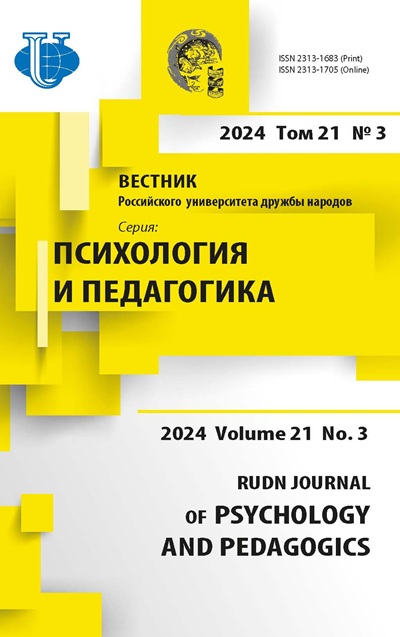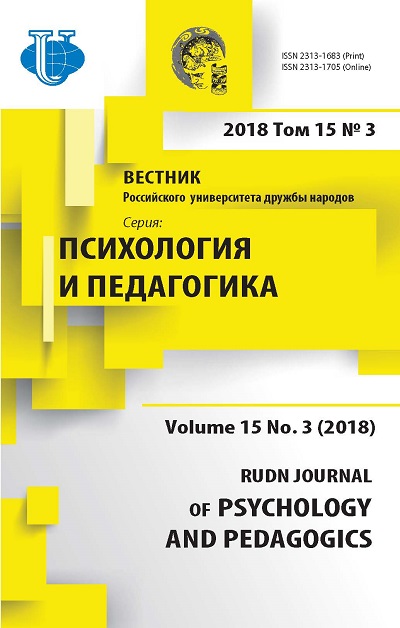САМОРЕГУЛЯЦИЯ И САМОРЕГУЛЯТИВНЫЕ СПОСОБНОСТИ: КОМПОНЕНТЫ, УРОВНИ, МОДЕЛИ
- Авторы: Ожиганова Г.В.1
-
Учреждения:
- Институт психологии РАН
- Выпуск: Том 15, № 3 (2018)
- Страницы: 255-270
- Раздел: ТЕОРЕТИЧЕСКИЕ И МЕТОДОЛОГИЧЕСКИЕ ПРОБЛЕМЫ СОВРЕМЕННОЙ ПСИХОЛОГИИ
- URL: https://journals.rudn.ru/psychology-pedagogics/article/view/19461
- DOI: https://doi.org/10.22363/2313-1683-2018-15-3-255-270
Цитировать
Полный текст
Аннотация
В статье рассматриваются разные определения саморегуляции. Приводятся представления о саморегуляции, сложившиеся в рамках зарубежной и отечественной психологии, которые показывают, что саморегуляция изучается в связи с разными аспектами жизнедеятельности: процесс обучения, профессиональная деятельность, благополучие, регулирование состояния здоровья и др. Саморегуляция в основном определяется с помощью термина «способность», что заставляет более глубоко осмыслить сам термин саморегулятивные способности. Теоретический анализ компонентов, уровней, моделей саморегуляции позволяет говорить об их разнообразии, но все же необходимо выделить общие ключевые компоненты: мотивацию; стандарты поведения (включая морально-ценностные ориентиры); выдвижение целей; проектирование условий, необходимых для достижения целей; способность к мониторингу процесса саморегуляции (самоконтроль); оценка и коррекция результатов; способность проявлять волю в достижении поставленных целей. Теоретический анализ различных компонентов, уровней, моделей саморегуляции показал, что в них отсутствует духовная составляющая. В этой связи автором были предложены две модели, включающие духовный аспект: а) четырехуровневая модель саморегуляции; б) четырехуровневая модель саморегуляции и саморегулятивных способностей. Обе модели содержат высший духовный уровень саморегуляции, связанный с ориентацией на высшие моральные принципы, высшие ценности и смыслы. Высшие саморегулятивные способности, соответствующие этому уровню, способствуют раскрытию духовного потенциала и мобилизации энергии для бескорыстного служения обществу. Это позволяет повышать энергетический ресурс саморегуляции в целом и создавать условия для улучшения качества жизни и продуктивной жизнедеятельности.
Об авторах
Галина Валентиновна Ожиганова
Институт психологии РАН
Email: symosium2016@rambler.ru
кандидат психологических наук, старший научный сотрудник лаборатории психологии способностей и ментальных ресурсов Института психологии РАН Российская Федерация, 129366, Москва, Ярославская ул., 13
Список литературы
- Anokhin, P.K. (1970). The Theory of functional system. Success of physiological science, 1(1)
- Bandura, A. (1982). Self-efficacy mechanism in human agency. American Psychologist, 37, 122-147
- Bandura, A. & Cervone, D. (1983). Self-evaluative and self-efficacy mechanisms governing the motivational effects of goal systems. Journal of Personality and Social Psychology, 45, 1017-1028
- Bandura, A. (1991a). Social cognitive theory of self-regulation. Organizational Behavior and Human Decision Processes, 50, 248-287
- Bandura, A. (1991b). Self-regulation of motivation through anticipatory and self-regulatory mechanisms. In R.A. Dienstbier (Ed.), Perspectives on motivation: Nebraska symposium on motivation, 38, 69- 164. Lincoln: Univ. of Nebraska Press
- Baumann, N., Kaschel, R., & Kuhl, J. (2005). Striving for unwanted goals: Stressdependent discrepancies between explicit and implicit achievement motives reduce subjective well-being and increase psychosomatic symptoms. Journal of Personality and Social Psychology, 89, 781-799
- Baumeister, R.F., & Vohs, K.D. (2007). Self-Regulation, Ego Depletion, and Motivation. Social and Personality Psychology Compass, (1), 115-128
- Baumeister, R., Schmeichel, B., & Vohs, K. (2007). Self-Regulation and the Executive Function: The Self as Controlling Agent. In A. W. Kruglanski & E.T. Higgins (Eds.), Social psychology: Handbook of basic principles (Second edition). New York, United States: Guilford Press, 516-539
- Baumeister, R., Vohs K.D., & Tice D.M. (2007). The Strength Model of Self-Control. Current directions in psychological science. 16, 6, 351-355
- Berk, L.E. (2003). Child development. Boston, MA: Allyn and Bacon
- Bodrov V.A. (2006). Psychological stress: development and coping. Moscow: Per SE. (In Russ.)
- Brief Dictionary of Psychological Terms. Retrieved from: https://vocabulary.ru/slovari/kratkii-slovarpsihologicheskih-terminov.html (In Russ.)
- Cameron, D., Webb, Th. (2013). Self-Regulatory Capacity. Encyclopedia of Behavioral Medecine, 1757-1759. Retrieved from: https://link.springer.com/referenceworkentry/10.1007% 2F978-1-4419-1005-9_1177
- Carver, C.S., & Scheier, M.F. (1998). On the self-regulation of behavior. Cambridge, UK: Cambridge University Press.
- Cameron, L., & Leventhal, H. (Eds.), (2003). The Self-regulation of Health and Illness Behaviour. American Psychological Associations.
- Corno, L. (1989). Self-regulated learning: A volitional analysis. In B.J. Zimmerman & D.H. Schunk (Eds.), Self-regulated learning and academic achievement: Theory, research, and practice (pp. 111- 141). New York: Springer.
- Dictionary of Sociology. Retrieved from http://enc-dic.com/sociology/Samoreguljacija-8060.html (In Russ.).
- Diehl, M., Semegon, A.B., & Schwarzer, R. (2006). Assessing attention control in goal pursuit: A component of dispositional self-regulation. Journal of Personality Assessment, 86, 306-317.
- Dikaya, L.G. (2003). Mental self-regulation of a person’s functional state. Moscow: Institute of Psychology Publ. (In Russ.).
- Encyclopaedic dictionary: Psychology of labor, management, engineering psychology and ergonomics). Retrieved from: https://vocabulary.ru/slovari/110-enciklopedicheskii-slovar-psihologija-trudaupravlenija-inzhenernaja-psihologija-i-ergonomika.html (In Russ.)
- Fischera, S., & Munsch, S. (2012). Self-Regulation in Eating Disorders and Obesity - Implications for Treatment. (English Version of) Verhaltenstherapie, 22, 158-164. doi: 10.1159/000341540
- Gollwitzer, P.M., Fujita, K., & Oettingen, G. (2004). Planning and the implementation of goals. In R.F. Baumeister & K.D. Vohs. (Eds). Handbook of Self-Regulation (pp. 211-228). New York: The Guilford Press.
- Gonzalez, A.M. (2013). Six Principles of Self-Regulated Learning: Developing Self-Regulated Language Learners. Retrieved from: https://scholarsarchive.byu.edu/cgi/viewcontent.cgi?article = 5051&context = etd
- Gross, J.J. (2007). Handbook of Emotion Regulation. New York: The Guilford Press.
- Gross, J.J., & John, O.P. (2003). Individual differences in two emotion regulation processes: implications for affect, relationships, and well-being. Journal of Personality and Social Psychology, 85, 348-362.
- Hofer, J., Busch, H., Kärtner J. (2011). Self-regulation and well-being: The influence of identity and motives. European Journal of Personality, 25, 211-224.
- Hustad, J., Carey, K. Carey, M., & Maisto, S. (2009). Self-Regulation, Alcohol Consumption, and Consequences in College Student Heavy Drinkers: A Simultaneous Latent Growth Analysis. Journal of Studies on Alcohol and Drugs, 70(3), 373-382.
- Ivannikov, V.A. (2010). Volition. National Psychological Journal, 1(3), 97-102. (In Russ.).
- Job, V., Dweck, C.S., & Walton, G.M. (2010). Ego depletion - Is it all in your head? Implicit theories about willpower affect self-regulation. Psychological Science, 21, 1686-1693. doi: 10.1177/ 0956797610384745
- Job, V., Walton, G.M., Bernecker, K., & Dweck, C.S. (2015). Implicit Theories About Willpower Predict Self-Regulation and Grades in Everyday Life. Journal of Personality and Social Psychology, 108(4), 637-647. doi: 10.1037/pspp0000014
- Karoly, P. (1993). Mechanisms of self-regulation: a systems view. Annual Review of Psychology, 44, 23-52.
- Kaschel, R., & Kuhl, J. (2004). Motivational counseling in an extended functional context: Personality systems interaction theory and assessment. In W.M. Cox & E. Klinger (Eds.), Motivational counseling: Motivating people for change (pp. 99-119). Sussex: Wiley.
- Kent, M. (2006). Oxford Dictionary of Sports Science & Medicine (3 ed.). Oxford: Oxford University Press.
- Konopkin, O.A. (1995). Psychic Self-regulation of arbitrary human activity. Voprosy Psikhologii, (1), 7-12. (In Russ.).
- Konopkin, O.A. (2007). The mechanisms of conscious self-regulation of voluntary activity of the person. In V.I. Morosanova (Ed.), Subject and personality in psychology of self-regulation. Moscow, Stavropol. PI RAO Publ., Sevkavgtu Publ., 12-31. (In Russ.).
- Kuhl, J. (2000). The volitional basis of personality systems interaction theory: Applications in learning and treatment contexts. International Journal of Educational Research, 33, 665-703.
- Kuhl, J. (2001). Motivation und Personlichkeit. Interaktionen psychischer Systeme [Motivation and personality: Interactions of mental systems]. Gettingen: Hogrefe.
- Kuhl, J., & Koole, S.L. (2004). Workings of the will: A functional approach. In J. Greenberg, S.L. Koole, & T. Pyszczynski (Eds.), Handbook of experimental existential psychology (pp. 411-430). New York: Guilford Press.
- Kuhl, J., Kazén, M., & Koole, S. (2006). Putting Self-Regulation Theory into Practice: A User’s Manual. Applied Psychology, 55 (3), 408-418.
- Miller, E.M., Walton, G.M., Dweck, C.S., Job, V., Trzesniewski, K.H., & McClure, S.M. (2012). Theories of Willpower Affect Sustained Learning. In J.J. Geng (Ed.), PLoS ONE, 7(6), e38680. doi: 10.1371/journal.pone.0038680
- Leonova, A.B. (2007). Mental reliability of the professional and contemporary technologies of stress management. Vestnik Moskovskogo Universiteta. Seriya 14. Psikhologiya, (3), 69-81. (In Russ.).
- Leontiev, A.N. (1975). Activity. Consciousness. Personality. Moscow: Politizdat Publ. (In Russ.).
- Morosanova, V.I. (1998). Individual style of self-regulation: the phenomenon, the structure and functions of human voluntary activity. Moscow: Nauka Publ. (In Russ.).
- Mann, T., De Ridder, D., & Fujita, K. (2013). Self-regulation of health behavior: Social psychological approaches to goal setting and goal striving. Health Psychology, 32(5), 487-498. doi: 10.1037/ a0028533
- Mischel, W. & Liebert, R.M. (1966). Effects of discrepancies between observed and imposed reward criteria on their acquisition and transmission. Journal of Personality and Social Psychology, (3), 45-53.
- Mischel, W. & Ayduk, O. (2004). Willpower in a cognitive-affective processing system: the dynamics of delay of gratification. In R.F. Baumeister & K.D. Vohs (Eds), Handbook of Self -Regulation (pp. 99-129). New York: The Guilford Press.
- Ochsner, K.N., & Gross, J.J. (2005). The cognitive control of emotion. Trends in Cognitive Science, 9, 242-249.
- Osnitsky, A.K. (2000). The structure, content and functions of a regulatory experience of the person. Doctor Sc. in Psychology Thesis. Moscow: Institute of Psychology of Russian Academy of Sciences. (In Russ.).
- Ozhiganova, G.V. (2010). Psychological aspects of spirituality: spiritual abilities. Psikhologicheskii Zhurnal, 31(5), 39-53. (In Russ.).
- Ozhiganova, G.V. (2016). Spiritual capacities as a resource of life activity. Moscow: Institute of Psychology of Russian Academy of Sciences publ. (In Russ.).
- Prokhorov, A.O. (2005). Self-regulation of mental states: phenomenology, mechanisms, laws. Moscow, PER SE. (In Russ.).
- Prygin, G.S. (2009). Psychology of autonomy. Izhevsk, Naberezhnye Chelny, Institut upravleniya Publ. (In Russ.).
- Ross, T. & Fontao, M.I. (2006). Self-regulation and emotional experience: Preliminary findings in nonsexual and sexual offenders. Sexual Offender Treatment, 1(2). Retrieved from http://www.sexualoffendertreatment. org/17.0.html
- Ross, T., & Fontao, M.I. (2007). The relationship of self-regulation and aggression: An empirical test of Personality Systems Interaction Theory. International Journal of Offender Therapy and Comparative Criminology, 52(5). 554-570.
- Ross, T., Fontao, M.I., & Schneider, R. (2007). Aggressive behavior in male offenders: preliminary analyses of self-regulatory functions in a sample of criminals. Psychological Reports, 100, 1171- 1185
- Rueda, M.R., Posner, M.I., & Rothbart, M.K. (2011). Attentional control and self-regulation. In R.F. Baumeister, K.D. Vohs (Eds.), Handbook of self-regulation: Research, theory, and applications (pp. 284-299). New York, NY: Guilford Press
- Shanker, S.G. (2012). Calm, Alert and Learning: Classroom Strategies for Self-Regulation. Pearson).
- Schunk, D.H. (1985). Participation in goal-setting: Effects on self -efficacy and skills of learning disabled children. Journal of Special Education, 19, 347-369.
- Schunk, D.H. (1990). Goal setting and self-efficacy during self-regulated learning. Educational Psychologist, 25, 71-86.
- Schunk, D.H. (2001). Social cognitive theory and self-regulated learning. In B.J. Zimmerman and D.H. Schunk (Eds.), Self-regulated learning and academic achievement. (pp. 125-154). Mahwah: NJ: Lawrence Erlbaum Associates, Inc.
- Schunk, D.H., & Zimmerman, B.J. (1997). Social origins of self-regulatory competence. Educational Psychologist, 32, 195-208.
- Stolin, V.V. (1985). Knowledge of self and attitude to the self in the self-consciousness structure. Doctor Sc. in Psychology Thesis. Moscow. (In Russ.).
- Tittle, C.R., Ward, D.A., & Grasmick, H.G. (2003). Self-control and crime/deviance: Cognitive vs. behavioral measures. Journal of Quantitative Criminology, 19, 333-365.
- Zimmerman, B.J. & Ringle, J. (1981). Effects of model persistence and statements of confidence on children’s efficacy and problem solving. Journal of Educational Psychology, 73, 485-493.
- Zimmerman, B., Bonner, S., & Kovach, R. (1996). Goal 1: Understanding the principles of selfregulated learning. In Developing self-regulated learners: Beyond achievement to self-efficacy (pp. 5-24). Washington, D.C.: American Psychological Association
- Zimmerman, B.J. (2001). Theories of Self-Regulated Learning and Academic Achievement: An Overview and Analysis. In Zimmerman, B.J. & Schunk, D.H. (Eds.), Self-Regulated Learning and Academic Achievement: Theoretical Perspectives (pp. 1-65). Mahwah, NJ: Lawrence Erlbaum Associates, Publishers
- Zimmerman, B.J. (2002). Becoming a self-regulated learner: An overview. Theory into Practice, 41(2), 64-70
















